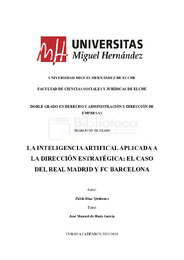Please use this identifier to cite or link to this item:
https://hdl.handle.net/11000/33380Full metadata record
| DC Field | Value | Language |
|---|---|---|
| dc.contributor.advisor | DE HARO, JOSE MANUEL | - |
| dc.contributor.author | Díaz Quiñones, Pablo | - |
| dc.contributor.other | Departamentos de la UMH::Ciencia Jurídica | es_ES |
| dc.date.accessioned | 2024-10-03T08:23:06Z | - |
| dc.date.available | 2024-10-03T08:23:06Z | - |
| dc.date.created | 2024-06 | - |
| dc.identifier.uri | https://hdl.handle.net/11000/33380 | - |
| dc.description.abstract | En el presente trabajo de fin de grado tratará de mostrar las posibles aplicaciones de la Inteligencia Artificial (IA) en la dirección estratégica en dos de los clubes más importantes del mundo, como son el Real Madrid y el FC Barcelona. Para ello, en primer lugar, expondremos las ideas básicas de la dirección estratégica empresarial, así como, los conceptos básicos de la IA, analizando tanto su historia como su potencial. En segundo lugar, nos centraremos en mostrar las posibilidades que tiene la IA aplicada en el mundo empresarial en general y en el ámbito estratégico en particular. Por último, pasaremos a realizar el análisis estratégico pertinente tanto del Real Madrid como del FC Barcelona con ayuda de la IA para mostrar sus posibilidades de uso y aspectos positivos y negativos, teniendo en cuanta que estamos en unos ámbitos, como es el análisis estratégico y el de los clubes deportivos, donde la IA todavía no se ha asentado como una herramienta de la que extraer posibles ventajas competitivas. | es_ES |
| dc.description.abstract | In this final degree project, he will try to show the possible applications of Artificial Intelligence (AI) in strategic management in two of the most important clubs in the world, such as Real Madrid and FC Barcelona. To do this, first of all, we will present the basic ideas of business strategic management, as well as the basic concepts of AI, analyzing both its history and its potential. Secondly, we will focus on showing the possibilities that applied AI has in the business world in general and in the strategic field in particular. Finally, we will proceed to carry out the relevant strategic analysis of both Real Madrid and FC Barcelona with the help of AI to show their possibilities of use and positive and negative aspects, taking into account that we are in areas, such as strategic analysis and that of sports clubs, where AI has not yet established itself as a tool from which to extract possible competitive advantages. | es_ES |
| dc.format | application/pdf | es_ES |
| dc.format.extent | 131 | es_ES |
| dc.language.iso | spa | es_ES |
| dc.publisher | Universidad Miguel Hernández de Elche | es_ES |
| dc.rights | info:eu-repo/semantics/openAccess | es_ES |
| dc.rights | Attribution-NonCommercial-NoDerivatives 4.0 Internacional | * |
| dc.rights.uri | http://creativecommons.org/licenses/by-nc-nd/4.0/ | * |
| dc.subject | Inteligencia artificial | es_ES |
| dc.subject | dirección estratégica | es_ES |
| dc.subject | clubes de fútbol | es_ES |
| dc.subject.other | CDU::3 - Ciencias sociales | es_ES |
| dc.title | La inteligencia artificial aplicada a la dirección estratégica: el caso del Real Madrid y FC Barcelona | es_ES |
| dc.type | info:eu-repo/semantics/bachelorThesis | es_ES |

View/Open:
TFG ADE - Pablo Díaz Quiñones.pdf
2,29 MB
Adobe PDF
Share:
.png)
